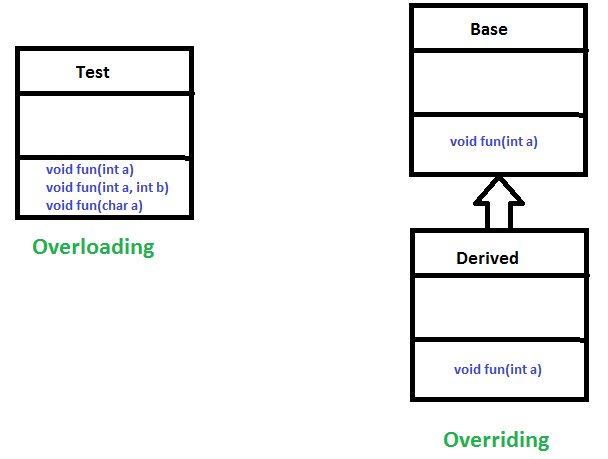The word polymorphism means having many forms. In simple words, we
can define polymorphism as the ability of a message to be displayed in
more than one form. Real life example of polymorphism: A person at the same time
can have different characteristic. Like a man at the same time is a
father, a husband, an employee. So the same person posses different
behaviour in different situations. This is called polymorphism.
Polymorphism is considered as one of the important features of Object
Oriented Programming. Polymorphism allows us to perform a single action
in different ways. In other words, polymorphism allows you to define
one interface and have multiple implementations. The word “poly” means
many and “morphs” means forms, So it means many forms.
In Java polymorphism is mainly divided into two types:
- Compile time Polymorphism
- Runtime Polymorphism
Compile time polymorphism: It is also known as static polymorphism. This type of polymorphism is achieved by function overloading or operator overloading.
class MultiplyFun {
static int Multiply(int a, int b)
{
return a * b;
}
static int Multiply(int a, int b, int c)
{
return a * b * c;
}
}
class Main {
public static void main(String[] args)
{
System.out.println(MultiplyFun.Multiply(2, 4));
System.out.println(MultiplyFun.Multiply(2, 7, 3));
}
}
Output:
8
42
class MultiplyFun {
static int Multiply(int a, int b)
{
return a * b;
}
static double Multiply(double a, double b)
{
return a * b;
}
}
class Main {
public static void main(String[] args)
{
System.out.println(MultiplyFun.Multiply(2, 4));
System.out.println(MultiplyFun.Multiply(5.5, 6.3));
}
}
Output:
8
34.65
class Animal {
public void animalSound() {
System.out.println("The animal makes a sound");
}
}
class Pig extends Animal {
public void animalSound() {
System.out.println("The pig says: wee wee");
}
}
class Dog extends Animal {
public void animalSound() {
System.out.println("The dog says: bow wow");
}
}
class MyMainClass {
public static void main(String[] args) {
Animal myAnimal = new Animal(); // Create a Animal object
Animal myPig = new Pig(); // Create a Pig object
Animal myDog = new Dog(); // Create a Dog object
myAnimal.animalSound();
myPig.animalSound();
myDog.animalSound();
}
}

class MultiplyFun {
static int Multiply(int a, int b)
{
return a * b;
}
static int Multiply(int a, int b, int c)
{
return a * b * c;
}
}
class Main {
public static void main(String[] args)
{
System.out.println(MultiplyFun.Multiply(2, 4));
System.out.println(MultiplyFun.Multiply(2, 7, 3));
}
}
Output:
8
42
class MultiplyFun {
static int Multiply(int a, int b)
{
return a * b;
}
static double Multiply(double a, double b)
{
return a * b;
}
}
class Main {
public static void main(String[] args)
{
System.out.println(MultiplyFun.Multiply(2, 4));
System.out.println(MultiplyFun.Multiply(5.5, 6.3));
}
}
Output:
8
34.65
class Animal {
public void animalSound() {
System.out.println("The animal makes a sound");
}
}
class Pig extends Animal {
public void animalSound() {
System.out.println("The pig says: wee wee");
}
}
class Dog extends Animal {
public void animalSound() {
System.out.println("The dog says: bow wow");
}
}
class MyMainClass {
public static void main(String[] args) {
Animal myAnimal = new Animal(); // Create a Animal object
Animal myPig = new Pig(); // Create a Pig object
Animal myDog = new Dog(); // Create a Dog object
myAnimal.animalSound();
myPig.animalSound();
myDog.animalSound();
}
}
No comments:
Post a Comment